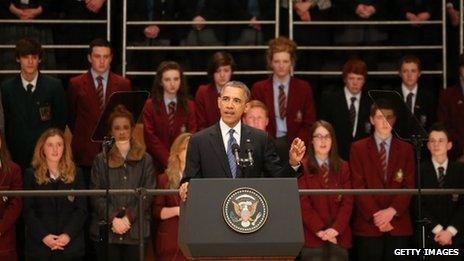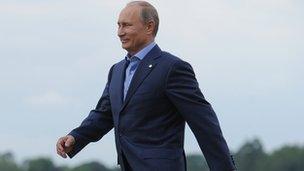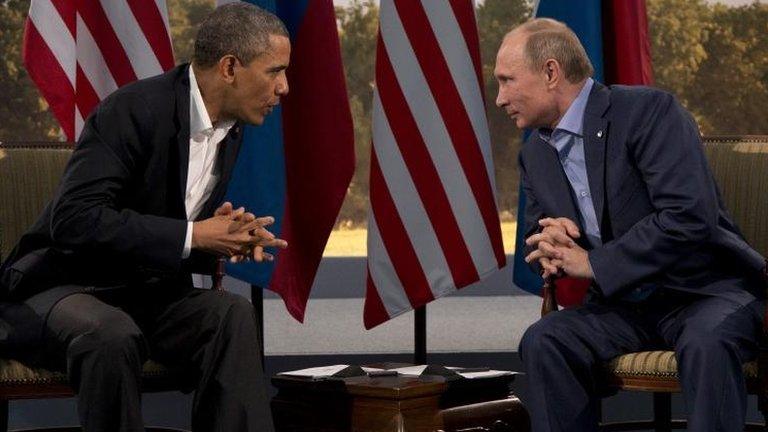The two Obamas: Avoiding Syria in Belfast
- Published
- comments

This was a tale of two President Barack Obamas, the one with high dreams and the one who must deal with grubby realities.
In the Belfast hall there was some of the old excitement. As the crowd waited for Mr Obama to appear, the rather staid dignitaries in the upper gallery performed a Mexican wave, to the delight of the school children in the audience.
Here, he still has some lingering rock star status. His words were lofty, serious and inspirational. He told the young people that many around the world looked to Northern Ireland as an example of how to make peace.
He urged them not to rest there but to break down more walls, heal more wounds. There is a feeling here that peace has become so entrenched, so normal that many are content to accept the gains and not try to improve the two communities.
This is the president as the inspirer-in-chief.
It reminded me of his speech in Israel. That was a more important moment, but similar in that he was exhorting young people to reach for their better selves over the heads of bickering politicians, using his own background and America's civil rights struggle as an example of what can be achieved.
It is where cynics think, "What a president he would make! Oh, hang on, he already is."
Hard sell to Russia

Vladimir Putin is the man to convince in Belfast - but that will be a tough road
For this was surely an opportunity missed.
He was talking about ending conflict and bringing peace, yet he still has not talked about the biggest conflict in the world today - Syria.
He has made no attempt to explain his shift in policy. That is not to claim there are easy, glib answers, but he's good at complexity and this is a serious issue that needs grown-up debate.
He wants to avoid getting embroiled in another Middle East war and to avoid the US dictating outcomes in the region, but he doesn't want Syria to spiral further into chaos or President Bashar al-Assad to continue in power.
His meeting with Vladimir Putin will be interesting, because the Russian president knows what he wants and says it.
At the moment the US and the UK look irresolute - talking about increasing help to the rebels without spelling out what they are doing, talking about a diplomatic solution when none is in sight.
Russia, on the other hand, appears firm, arguing a no-fly zone would be illegal, and that backing the legitimate government and selling arms to them should be behaviour beyond reproach.
The president's rhetoric may inspire school children, but it is unlikely to melt Mr Putin.
- Published17 June 2013

- Published17 June 2013